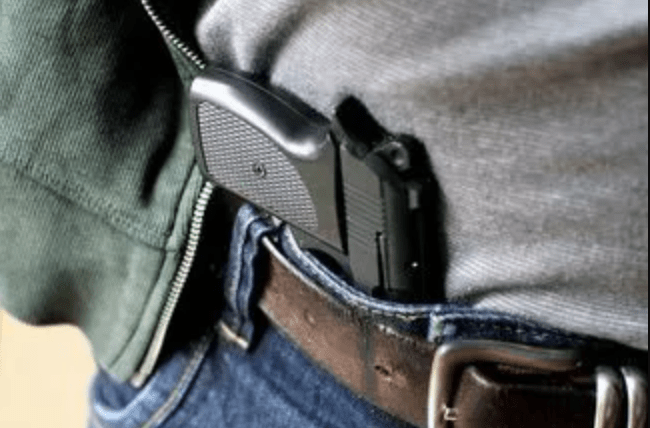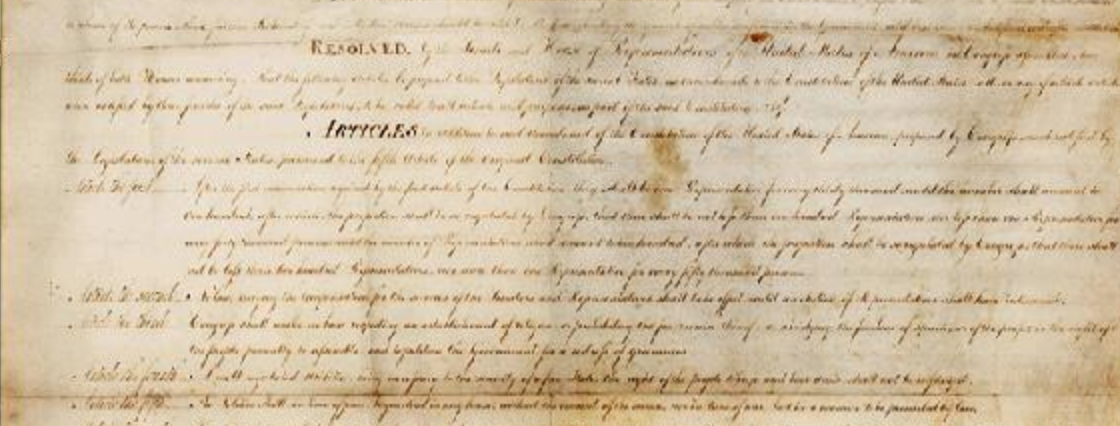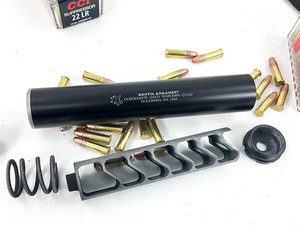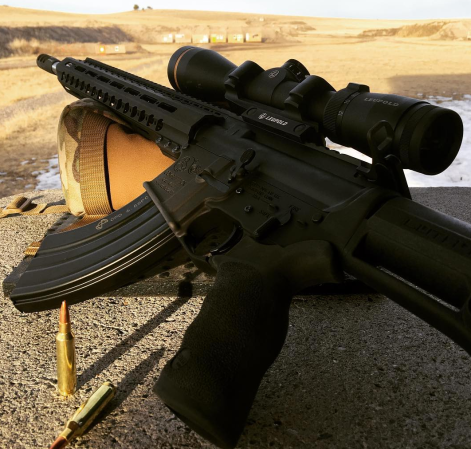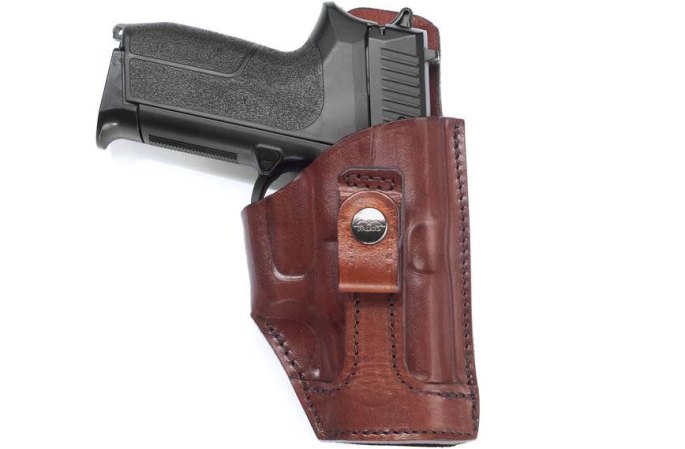We may earn revenue from the products available on this page and participate in affiliate programs. Learn More ›
TOP STORY
American Gunmakers Poised For Growth — Even Without Obama, Hillary
American gunmakers produced more than 11 million firearms in 2016, setting a new annual record and doubling yearly output from 2009, according to the U.S. Bureau of Alcohol, Tobacco, Firearms and Explosives (BATFE).
The obvious instant analysis of the industry’s growth is to attribute it to fears about the erosion of gunowners’ rights under the Obama administration and the near-hysteria over the prospect of gun control matriarch Hillary Clinton being elected president in 2016.
It is an obvious instant analysis because, of course, there’s some truth to it. But it doesn’t tell the whole story.
While early indicators show declining gun sales in 2017 following the election of Second Amendment-friendly Donald Trump as president, “the industry seems positioned to begin growing again,” writes John Sommers of Reuters, who reports some experts predict the firearms business will return to an upward trajectory and could even eventually eclipse 2016.
“The numbers clearly will come back from the current levels,” Moody’s financial analyst Kevin Moody told Sommers. “Will they ever surpass 2016 levels? I don’t know. Maybe over time, but a lot of that will depend on politics.”
“What would be a home run for the gun industry and what could put them beyond 2016 levels,” Moody continued, “would be if you had a Democratic president and a supermajority in both the House and the Senate, because it would be a no-brainer that you could pass gun regulations.”
A key reason why gunmakers could continue to thrive is because about 40 percent, or 4.5 million, of the 11 million firearms manufactured in 2016 were produced by three publicly traded companies that are well-positioned to generate innovative products that will stimulate the market.
Smith & Wesson, held under the American Outdoor Brands Corp.; Sturm, Ruger & Co.; and Vista Outdoor, which owns Savage Arms, a popular rifle company aren’t going anywhere, Tom Diaz, an author who has written multiple books on the gun industry, told Sommers.
“This is a much more sophisticated industry than it used to be in terms of financing and their corporate ability and their international linkages,” Diaz said. “This is just like anything else that’s an internationalized or globalized industry, and it ain’t going back in the bottle.”
For more, go to:
— U.S. Gun Companies Manufactured A Record 11 Million Firearms In 2016
— Bright future for shooting sports
— Examining the intersection between digital rights and gun rights (VIDEOS)
— Preventing Suicide While Protecting Gun Rights
— AUSTRALIA’S AMBASSADOR SAYS HIS COUNTRY’S GUN LAWS CAN’T SAVE AMERICA
— Gun Control Is as Old as the Old West
— U.S. guns used in a majority of crimes in Mexico, Center for American Progress says
— Sen. Gillibrand slammed by GOP opponent for shifting position on gun control
DEATH BY ADVERTISING
Sandy Hook Suit’s ’Negligent Entrustment’ Claim Poses Ramifications For All Manufacturers
The Connecticut Supreme Court is expected to issue a ruling this year in a request by attorneys representing surviving family members of the December 2012 Sandy Hook massacre to reinstate their wrongful death lawsuit against Remington, which manufactured the Bushmaster XM15-E2S that Adam Lanza used to murder 20 first-graders and six educators.
At issue, potentially, is the 2005 Protection of Lawful Commerce in Arms Act (PLCAA), which exempts gun-makers from liability when their products are used in crimes. In October 2016, Connecticut Superior Court Judge Barbara Bellis dismissed the Sandy Hook families’ suit because it “falls squarely within the broad immunity” provided gun manufacturers and dealers by the PLCAA.
But in a Feb. 7 analysis by Sam Bocetta in LegalReader.com, lawyers for the families claim a loophole in the PLCAA permits suits against companies that know, or should be expected to know, that their wares are likely to be used “in a manner involving unreasonable risk of physical injury to the person or others.”
It is called “negligent entrustment” and in usually used in cases involving unlicensed or reckless drivers who injuries to others while driving another person’s vehicle, Bocetta writes.
There is a precedent that could be applicable in the Sandy Hook suit: a 1977 ruling by the Michigan Supreme Court in Moning v. Alfono that reversed lower court decisions in a suit against a company that produced high-velocity slingshots, making the manufacturer liable for the misuse of its product by an 11-year-old boy.
Bocetta writes the correlation between the Michigan ruling and the case before the Connecticut Supreme Court is “tenuous at best” because slingshots are directly marketed to young children while Remington Arms “has minimal visibility when it comes to advertising and has no track record of marketing their firearms to teens.”
Nevertheless Josh Koskoff, one of the families’ attorneys, has alleged in court that Remington markets its Bushmaster XM15-E2S directly to people like Adam Lanza. “No evidence of this was presented in court save for Koskoff’s assertion that Lanza idolized the military and Remington marketed its AR-15s as the weapon of choice for the Army Rangers,” Bocetta writes.
Remington Arms attorney James Vogts told Bocetta that Koskoff’s “negligent entrustment” argument is baseless. “There is no case law on advertising being declared a cause of death,” he said.
But that is exactly what could be debated should the Connecticut Supreme Court agree to hear the appeal, which is why the case could ultimately have ramifications for all manufacturers, not just gun makers.
For more, go to:
— Sandy Hook Remington Lawsuit Relies on 1977 MI Supreme Court Decision
— When a Gun Maker Proposed Gun Control
— 7News Investigates: ‘Ghost Guns’ Raising Alarms for Law Enforcement
— Law enforcement: So-called ghost guns are ‘troubling trend’
— Loophole allows people to assemble ‘ghost guns’
— Want to Make an Untraceable Handgun at Home? Cody Wilson Can Help
— FBI had resources to halt Dylann Roof’s gun buy, but it didn’t use them — and still doesn’t
— Modern American rights claims: An avoidable clash of absolutes
STATE ROUNDUP
More Wrenn Fallout: Suit Challenges New Jersey’s ‘Justifiable Need’ Prohibition
The Association of New Jersey Rifle & Pistol Clubs (ANJR&PC) on Feb. 5 filed a lawsuit in federal district court in Newark seeking to overturn the state law requiring anyone who seeks to carry a gun in public to demonstrate a “justifiable need.”
The complaint, Rogers v. Grewal, includes the claim that the law’s requirement for case-by-case decision-making about who may carry a gun in public violates the Second Amendment. The suit was filed by Thomas Rogers, of Wall Township, whose application to carry a gun in public was denied.
That ANJR&PC also filed a 2010 suit challenging state law on public carry, Muller v. Maenza, that was unsuccessful. The U.S. District Court and the U.S. Court of Appeals for the Third Circuit affirmed the ruling. The U.S. Supreme Court declined to hear that case in May 2014.
But the situation has changed, the ANJR&PC notes on its website after the U.S. District Court for the District of Columbia’s ruling in Wrenn v. District of Columbia, which struck down a similar law in Washington as unconstitutional.
The fallout from the Wrenn ruling is only beginning to be felt: The New York State Rifle & Pistol Association (NYSRPA) on Feb. 1 filed a lawsuit against the New York State Police in the Northern District of New York U.S. District Court, challenging the state’s conceal-carry laws citing the ruling as its motivation for renewing legal efforts to roll back unconstitutional regulations of a fundamental individual right.
ANJR&PC’s suit also targets Drake v. Filko, the 2014 ruling from the U.S. Third Circuit that upheld New Jersey’s requirement for a showing of justifiable need.
For more, go to:
— NJ Curbs on Right to Carry Weapons Face New Challenge
— NRA Supports Challenge of New Jersey’s Restrictive Concealed Carry Permit System
— Wall man, gun clubs, NRA seek to eliminate New Jersey’s carrying restrictions
— Second Amendment activists challenge N.J.’s strict gun laws
— Miss. lawmaker displays pistol to protest gun legislation
— The SEC is worried about a Mississippi gun bill that could let guns into stadiums
— New Hampshire: Sununu Says Gun Laws Fine As Is
— Oregon Governor Wants ‘Boyfriend Loophole’ In Gun Law Closed
— Florida: Senate Ready To Take Up Church Gun Bill
— Proposals would further expand Iowa gun rights
— Washington: Additional Gun-Control Bill Fails Deadline, Others Still Moving
— New gun bill stirring controversy in Alabama
— West Virginia: State Senate passes bill clarifying gun carrying conditions
— Kansas House bill would ‘arm kids with the knowledge’ of specific gun safety courses
— Maryland: Gun rights group plans larger protest after two members arrested in Annapolis
— States, cities take lead on bump stock bans
— NY Dems introduce package of 9 gun control bills
— New Mexico: Gun Control Advocates Say Penalty Bill Won’t Help
— Connecticut: Pols Seek Bump Stock, “Ghost” Gun Ban
— Virginia: Virginia license plate becomes regrettable Rorschach test on guns
— House votes to remove fee for lifetime Indiana gun permit
— Massachusetts: Pro-Gun Bills Nearing Committee Deadline
— Marijuana legalization adds conflict for Vermont gun owners
— Illinois gun rights group has other gun free zones in sights to be shot down
— An Alaska open letter on gun violence to all lawmakers, state and national
IN THE COURTS
California Appeals Court Strikes Down State DOJ’s ‘One-Handgun-A-Month’ Limit
California’s 3rd District Court of Appeal on Feb. 8 struck down the state’s Department of Justice’s regulation that limited licensed gun-owners to purchasing no more than one handgun in any 30-day period, declaring it to be illegal.
The lawsuit, Doe v. Becerra, was filed in 2014, by Alvin Doe and Paul A. Gladden after California DOJ’s Bureau of Firearms sent them a letter notifying firearms dealers in the state that a new enforcement policy prevents Californians who hold both a federal firearms license and a state Certificate of Eligibility, or “COE,” from purchasing more than one handgun in any 30-day period.
After nearly two years of litigation, a Sacramento Superior Court upheld the DOJ’s policy. But the Feb. 8 Court of Appeal decision ruled the policy was illegal.
“This decision stands for the proposition that Attorney General Becerra and his Department of Justice are not above the law,” Calguns Foundation Executive Director Brandon Combs said a statement. “They can’t simply make up the law as they go, without following the rules or having a legal basis in the statutes. The DOJ fabricated and enforced an illegal policy and we put an end to it with this case.”
Combs said the ruling will serves as a citable precedent for other cases now before state and federal courts.
“Today’s decision is perhaps even more important because of the state’s new ammunition and assault weapon laws,” he said. “Attorney General Becerra has been doing similar things in other areas of state law, and we are eager to show that, like their illegal policy here, those also must be enjoined and struck down.”
For more, go to:
— Appeals Court Strikes Down Illegal DOJ Gun Control Policy
— Mother sues to regain access to school after gun flap
— Firearm activists aim at more Illinois gun free zones
— Supremes strike down state gun ban near Illinois public parks

